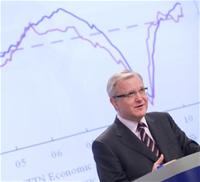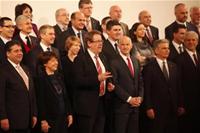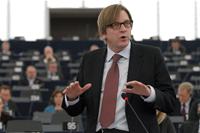Europe from Helsinki against Europe from Athens
Ralitsa Kovacheva, March 7, 2011
 On the eve of the euro area summit on 11 March, the two major political families in the EU (the European People's Party, EPP and the Party of European Socialists, PES) held their own summits, with quite opposite final results. Of course, this is expected and understandable given the ideological differences. The question is, however, is it justified to defend hollow principles at a time when EU countries, and especially the eurozone countries, are in an urgent need of ... money. Yes, this tool of capitalism, which is so unpopular among the Socialists, but they love to squander it in actions against poverty, social inequality and for decent life.
On the eve of the euro area summit on 11 March, the two major political families in the EU (the European People's Party, EPP and the Party of European Socialists, PES) held their own summits, with quite opposite final results. Of course, this is expected and understandable given the ideological differences. The question is, however, is it justified to defend hollow principles at a time when EU countries, and especially the eurozone countries, are in an urgent need of ... money. Yes, this tool of capitalism, which is so unpopular among the Socialists, but they love to squander it in actions against poverty, social inequality and for decent life.
But before we see the positions of the two parties on how to solve the problems in the euro area, let’s see how the idea of the Pact for Competitiveness has evolved, which is one of the most controversial points. As euinside wrote, the Franco-German proposal for a Pact for Competitiveness was presented just a month ago, at the European Council on 4 February.
The words of Angela Merkel and Nicolas Sarkozy made it clear then that the  Pact should be based on an intergovernmental agreement among the eurozone countries. According to the statement by the leaders of the euro area, annexed to the Council's conclusions, as far as the Commission President will ever be involved in the process, it will be concerning non-euro area Member States who would be interested in joining the Pact. German magazine Der Spiegel even wrote some time ago that Ms Merkel had generously promised to Mr Barroso at least the right to attend the eurozone summits.
Pact should be based on an intergovernmental agreement among the eurozone countries. According to the statement by the leaders of the euro area, annexed to the Council's conclusions, as far as the Commission President will ever be involved in the process, it will be concerning non-euro area Member States who would be interested in joining the Pact. German magazine Der Spiegel even wrote some time ago that Ms Merkel had generously promised to Mr Barroso at least the right to attend the eurozone summits.
For a month, however, the idea has undergone serious development. The President of the European Council Herman Van Rompuy was entrusted to prepare a proposal for a Pact for Competitiveness, together with the President of the European Commission and after consulting the Member States. The proposal is ready, although not publicly. We can judge about it from some comments that leaked in media, indicating that it is thematically similar to the idea of France and Germany, but retains the role of the Commission to monitor the implementation of the agreed measures.
No pact without the EC
 This message sounded unequivocally clear during the statement of EU Commissioner for Economic and Monetary Affairs Olli Rehn, when he presented the interim economic forecast of the EC. “For the new commitments currently being negotiated under the Competitiveness pact, for them to be effective and credible they must be anchored to the treaty based economic surveillance and especially to the new system of reinforced economic governance, including the European semester, so that we can have an effective mechanism over monitoring and in some cases enforcing policies. It is absolutely essential that implementation and surveillance of the policy commitments will be done through the reinforced economic governance and the new instruments and toolbox that it will provide to the EU. We don’t need only commitments on paper we need concrete delivery on the ground.”
This message sounded unequivocally clear during the statement of EU Commissioner for Economic and Monetary Affairs Olli Rehn, when he presented the interim economic forecast of the EC. “For the new commitments currently being negotiated under the Competitiveness pact, for them to be effective and credible they must be anchored to the treaty based economic surveillance and especially to the new system of reinforced economic governance, including the European semester, so that we can have an effective mechanism over monitoring and in some cases enforcing policies. It is absolutely essential that implementation and surveillance of the policy commitments will be done through the reinforced economic governance and the new instruments and toolbox that it will provide to the EU. We don’t need only commitments on paper we need concrete delivery on the ground.”
According to the European Commission, the Pact should not be limited to the eurozone countries only and must be “fully compatible to the Single market”. Mr Rehn explained that the priorities in the draft Pact for Competitiveness followed those of the Annual Growth Survey, presented by the EC earlier this year: strengthening of fiscal discipline, enhancing productivity and growth through structural reforms, linking retirement age to life expectancy, completion of the financial reform and restructuring of the banking sector.
A German journalist asked the Commissioner why was the elimination of wage indexation missing in this list, as requested by Paris and Berlin and whether this meant that the issue was not a priority to the Commission. Olli Rehn replied that wage development was a priority, even the first and foremost priority to many member states, but the question was how to measure it and what policy measures to implement to ensure that it reflected productivity. This view reflects the understanding of the European leaders, who disapprove the "one size fits for all" approach of France and Germany, European sources commented.
Europe from Helsinki
The proposal, not surprisingly, had found the support of those eurozone leaders  who are members of the EPP. After a meeting in Helsinki on 4 March, they announced that they not only supported the creation of the Pact but that “these processes should be monitored by the European Commission and the parts of the pact that are in the Union’s competence should be prepared by the community method”.
who are members of the EPP. After a meeting in Helsinki on 4 March, they announced that they not only supported the creation of the Pact but that “these processes should be monitored by the European Commission and the parts of the pact that are in the Union’s competence should be prepared by the community method”.
This means that the Commission will not be isolated from the economic governance of the euro area, as the initial statements from French and German side pointed out. For this purpose, the leaders from the EPP supported a swift approval by the Council and the Parliament of the Commission’s proposals on enhanced economic governance, the creation of the future European Stability Mechanism, as well as agreed on “measures needed to strengthen the European Financial Stability Facility to ensure its effectiveness if needed.”
The issues of the extension of the Greek loan’s maturity and lowering the interest rate of the Irish loan are also openly on the table. For the first thing recently hinted German Chancellor Angela Merkel, after a meeting with Greek Prime Minister Georgios Papandreou. The meeting in Helsinki was also attended by Enda Kenny, the Fine Gael leader, who is likely to be the new prime minister of Ireland. Present at the meeting was also the President of the European Council, Herman Van Rompuy, and European Commission President Jose Manuel Barroso, both members of the EPP. Why the meeting was held in Helsinki - where else if not (intentionally symbolically) in the capital of one of the least indebted EU countries.
And although the party chairman, Wilfried Martens, expressed hope that the Socialists would consider the EPP's proposals, at their meeting in Athens they adopted a Declaration with some totally different proposals, entitled "Europe is in the wrong hands." In this case too the place of meeting was symbolic - the capital of the country, evaluated with the highest probability of bankruptcy in the near future, although the Socialists could have seen another symbolism - the suffering of the Greek people.
Europe from Athens
 Much of the Declaration of Athens actually consists of criticism against the European conservatives who are said to be sacrificing the principles of solidarity and common destiny “by putting states and citizens in competition with each other”. The document doesn't spare any bright rhetoric against the “greed, irresponsible conservative government policies in some member states in the recent past and uncontrolled financial markets”, who were blamed for the crisis. The Socialists accused France and Germany, as well as the European Commission, for focusing only on austerity measures and defined the Pact for Competitiveness as “a diktat of an ultra-neo liberal and austerity-only agenda”.
Much of the Declaration of Athens actually consists of criticism against the European conservatives who are said to be sacrificing the principles of solidarity and common destiny “by putting states and citizens in competition with each other”. The document doesn't spare any bright rhetoric against the “greed, irresponsible conservative government policies in some member states in the recent past and uncontrolled financial markets”, who were blamed for the crisis. The Socialists accused France and Germany, as well as the European Commission, for focusing only on austerity measures and defined the Pact for Competitiveness as “a diktat of an ultra-neo liberal and austerity-only agenda”.
On the contrary, the Socialists offer instead of cutting wages and reducing social standards, to encourage competitiveness through a real European industrial policy directed towards growth and jobs creation. On top of that, according to the Socialists, at national level “common minimum social standards” should be adopted, which “must in particular guarantee minimum income, decent wages and quality of work.” Where to take money from to achieve these high noble activities? According to the Socialists, financial transactions tax (defined as a "fair" tax) and carbon tax should be introduced. It is not clear whether they think it is possible the introduction of these new taxes not to be at citizens' expense.
Equally strange is the vision of the Socialists how to resolve the debt crisis in the euro area – “We must strengthen the internal coherence of the eurozone, through targeted investments and higher wages”. (?!) The only common position with the conservatives is that “already granted financial support packages must be renegotiated, interest rates on loans lowered and more time must be given to repay the loans”. Expectedly, the Socialists support the idea of eurobonds in order to reduce the differences between the interest rates across member states.
The idea of the Pact for Competitiveness, but under the auspices of the European  institutions, was supported in a joint position of the leader of the ALDE group in the EP Guy Verhofstadt, and former presidents of the European Commission Romano Prodi and Jacques Delors. In an article by Guy Verhofstadt, published in the Financial Times, a joint position is expressed that the EU needed a “Community Act for economic convergence and governance in the Union“, similar to the Single Market Act. According to them, the “one size fits for all” approach is not appropriate, but it is better the Commission to set common goals or standards, to ensure compliance with them and have the right to impose sanctions. In this sense, the position of the three influential politicians is apparently similar to the proposal of the leaders of the European institutions, but we still do not know the details.
institutions, was supported in a joint position of the leader of the ALDE group in the EP Guy Verhofstadt, and former presidents of the European Commission Romano Prodi and Jacques Delors. In an article by Guy Verhofstadt, published in the Financial Times, a joint position is expressed that the EU needed a “Community Act for economic convergence and governance in the Union“, similar to the Single Market Act. According to them, the “one size fits for all” approach is not appropriate, but it is better the Commission to set common goals or standards, to ensure compliance with them and have the right to impose sanctions. In this sense, the position of the three influential politicians is apparently similar to the proposal of the leaders of the European institutions, but we still do not know the details.
It appears, however, that this version of the Franco-German idea will receive the support of the eurozone countries on 11 March. Not just because 15 current EU leaders are EPP members, and the meeting in Athens was attended by only one acting Prime Minister - Georgios Papandreou, but because besides improvement of competitiveness, the Pact aims another very important thing – to link the measures with financial assistance from the rescue fund for the euro area. Greek Prime Minister George Papandreou has hardly forgotten this fact, while hosting the meeting of PES in Athens. He will also hardly allow himself, sitting opposite to Ms Merkel at the eurozone summit on Friday, to use the empty rhetoric of the Athens declaration to obtain support for the extension of the Greek loan. Mr Papandreou obviously understands what it is about because last year he has worked rather against the principles advocated by his fellow Socialists.
Replacement of the principles
The problem with these "principles" is in the lack of principles: feeding some with other’s money is not solidarity, giving away money to everyone is not fair, nor is taxation of banks, which apparently will still be paid by their customers, as European Socialists are trying to convince us. In fact, the same is claimed by some Bulgarian politicians, moreover belonging to the conservative family. The public money, however, is our own money. It is not a principle to bribe us with our own money, is it?
 Angela Merkel, Emmanuel Macron | © Council of the EU
Angela Merkel, Emmanuel Macron | © Council of the EU Benoit Coeure | © Council of the EU
Benoit Coeure | © Council of the EU Pierre Moscovici | © Council of the EU
Pierre Moscovici | © Council of the EU | © European Parliament
| © European Parliament | © The Council of the European Union
| © The Council of the European Union | © European Parliament
| © European Parliament